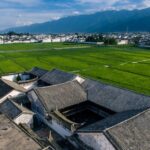Linden, an American, spent his 60th birthday in Xizhou, Yunnan. Looking back at his “prime years”, as Chinese people often say, he has spent more than half of his life in this country.
Four decades ago, he was a poor student in Chicago cleaning carpets for people. Due to a scholarship offered by China, he arrived on this unfamiliar land, not knowing a word of Chinese.
Two decades ago, he had traveled to more than 100 countries and had earned a doctorate in economics from Stanford University. Oddly enough, he sold his house in America, took all his cash, and returned to China with his wife and two children to settle in Xizhou. In this village of Dali, Yunnan, he rented an old mansion, poured in all his belongings of $700,000, and carefully refurbished it into the now famous Xiyuan.
At the peak of the boutique bed and breakfast industry, people approached him with money and even had a Land Rover delivered to his hotel. However, he rejected the rapid expansion and profits needed for worldly success. The initial $700,000 has not yet been fully recovered.
Villagers have dubbed him “Village Head Lin”
I met Linden in Bund two weeks ago. He was tall with golden long hair curled up on his shoulders. He was wearing a navy-blue Chinese-style short coat, tailored especially for him by a Suzhou designer who was deeply moved by his story.
His Chinese is very fluent. He calls the villagers “fellow villagers”, and they like to joke and call him “Village Head Lin”. Over the years, he has received 200,000 foreigners traveling in China, seeing the real Chinese countryside. Even the classmates of Obama’s daughter, from her high school in Washington, one of the best high schools in the U.S., would come here for a 5-month course.
When he passionately talks about everything in Dali, compared to him, we who live in the city, seem more like strangers wandering outside that land.
China gave him three opportunities
Linden never hesitates to express his feelings for China, and he has bluntly said in many situations: “All the happiness in my life is because of China.” This is not a cliché “foreigner falls in love with Chinese culture” story, but a story of mutual redemption might be a more appropriate description.
Linden was born into a blue-collar family in Chicago. As a young man, unable to afford tuition, he could only attend a community college and worked part-time cleaning carpets to earn money. One day when he was 20, he went to a professor’s house to clean carpets. The professor had just returned from China and asked him to help find China’s location on the world map on the wall and then insert a red flag to indicate that he had been there. “I started sweating because I had no idea where China was.” The professor couldn’t believe it and seriously suggested he could visit China. But going abroad was a far-off thing, and Linden didn’t have any hope.
Unexpectedly, not long after, he saw a poster outside the classroom about scholarships for international students provided by China. He tried to apply and was surprisingly accepted. He repeatedly confirmed over the phone: “Is it true? I’m Linden, the carpet cleaner.” The other party laughed: “You are a laborer, a member of the proletariat.”
“China in 1984 was one of the poorest countries in the world, while the U.S. was one of the richest countries in the world. However, the Chinese Embassy told me that they would provide educational assistance for an American youth in need. To this day, this is still the most valuable gift I have received.”
In the 1980s in China, there were few western faces, and Linden, who was quite good-looking, was invited to make a movie as a foreign student by the Beijing Film Studio on his second day on campus. The shooting experience of the film wasn’t great. He couldn’t speak Chinese, could only memorize lyrics to pretend to be speaking, and then have someone else dub for him. But he still regarded this experience as a valuable opportunity, which gave him the courage to pursue a life he couldn’t reach when he was young.
During the four years of studying abroad, he became a cameraman for the Beijing Bureau of CBS News; he fell in love with travel, spent more than 200 nights on the train exploring the mysterious eastern land; and during his postgraduate study in Nanjing, he met his future wife – Jenny, a Chinese-American. Later on, he was admitted to Stanford University, returned to the U.S. with Jenny, got married, had kids, and lived a successful life in a worldly sense.
But some imprints belonging to China have always been left. Starting from the stomach, he found that he could no longer digest dairy products. On the other hand, at that time, Americans knew very little about Asia, so he felt obligated to establish a cultural exchange platform. In 2004, he sold his house, returned to China with Jenny and two young children, and this time, he never left again.
Taking foreigners to get 3 yuan haircuts; Obama’s daughter’s classmates also come to take classes
Why did he choose Xizhou, Yunnan? Like many others, I couldn’t help but be curious about his choice at that time. Yunnan is home to 26 ethnic groups, and when Linden first came to Xizhou, no villager thought he was a foreigner, and they thought he was also from a minority group. “I said yes, I am from the 27th ethnic group, the American tribe.” “Here, we are all people of Yunnan, and I like their inclusiveness.”
So, he and his family registered to live there. At first for 3 days, then it extended to a month, and then it turned into a lifetime. There is an old mansion in Xizhou, which is a private house built by the famous businessman Yang Pinxiang in 1947. The rammed earth over 6 meters high, the elegant Chinese-style roof, complex wood carvings, exquisite stone carvings, and the characteristic cloister of the Bai ethnic group’s classical architecture. Linden fell for it at first sight, and decided to rent this house and restore it to its original state.
At that time, many old buildings in China were renovated into shopping centers and private clubs, changing their original appearance. Linden insisted on “repairing the old as old”. He hired more than 100 local villagers, spent 18 months, and finally built Xiyuan. Because he didn’t want to damage anything here, the restoration process was quite difficult, and the invested funds far exceeded expectations, but Linden felt that his purpose was achieved. “I hope that if one day, Yang Pinxiang returns to his mansion, he will not feel any change.” In order to build the bathroom, he took out some wood and made a hole to connect the water pipe. Then he numbered each piece of wood and stored it in the warehouse. “100 years from now, you can put all these pieces of wood back in their original places, and all you have to do is patch a small hole.”
Xiyuan is not just a hotel, Linden genuinely wants to turn it into a window to showcase Yunnan culture. Whenever foreign tourists come, he will take them to visit the morning market, pick tea, pick wild mushrooms, experience tie-dyeing… When an American government official came to Xizhou, the embassy called Linden: “Do you know who is staying in your hotel?” Linden said “I know”, and then continued to take people to chat with the villagers, and get a haircut in the local barber shop for 3 yuan.
Linden also wanted to influence more people. He contacted American schools and invited children to come to Xizhou for field trips, field research, and make friends with villagers. When they left, the children cried reluctantly. “They will take the experience of these 5 months into their future careers. When they grow up, they might understand a more real China. I am very proud of this.”
From Shaxi to Suzhou
Linden has never been a businessman. After Xiyuan became popular, he did not rush to expand, and only in 2021 did he open a second one in the ancient town of Shaxi nearby. There were no old houses in Shaxi to be renovated, so a new building had to be built. But how to do it without damaging the local environment and supporting the local people?
During casual chats with villagers, Linden found out that even though more and more people were building houses with cement, they always showed pride when talking about traditional rammed earth architecture. “So I thought, can I bring them a brand new rammed earth architecture? It’s well-designed, and comfortable to live in. They must be very happy.” So, a rammed earth hotel was born in Shaxi by the river and mountain. “From the other side of the lake, it seems to blend completely into the environment. It’s not a fancy building, it’s very simple. But once you are there, you will think it’s too beautiful.”
The third Xiyuan was located in Suzhou Rongchuntang. Linden and other staff worked with the “Fragrant Hill Group” craftsmen to transform this ancient building. Without changing the layout, 16 guest rooms were created. One-third of the mansion was turned into an educational base, which was severely hit during the pandemic, but has been slowly recovering recently.
Clumsy idealism
At 60, Linden still lives in Xizhou. He sincerely praised the prosperity of the Bund, where luxury shops and coffee houses abound. But only when talking about the stories of the countryside does he reveal a strong sense of belonging. “I hope I can stay in Yunnan for the rest of my life.”
Recently, he published a new book, “Searching for Homeland in China”, which records his half-life experience. When I asked him about the meaning of the book title, about what home is, he said he likes a line from Su Shi’s poem: “This is my home where my heart rests.” “I can foresee that my soul will forever roam the small paths of Xizhou.”
He and his family live in Xiyuan, and the hotel is their home. Every morning, he eats breakfast with the guests, chats with them, and introduces them to Xizhou. He knows that more and more people have heard the story of Xiyuan and come to visit specifically. If they can’t see him, they will be very disappointed. “So I try to give them as much of my energy and time as possible.”
Occasionally when he is not busy, he will go to the morning market to buy food, or go to the town to buy a cup of coffee. Twenty years ago, Xizhou was a closed little village, and those who consumed coffee were all outsiders. Today, 20 years later, Xizhou already has dozens of coffee shops, selling high-quality Yunnan coffee. The new generation of indigenous people no longer view working in Dongguan as the only way out, and many of them are willing to stay in Xizhou. This result is what Linden most wants to see.
Over the years, many investors have come to him, wanting him to open dozens of chain stores, but he has not agreed. Once, an investor directly drove a Land Rover to his door, intending to give him the car. Neither Linden nor his 60+ employees have a driver’s license, so the car just sat there. It wasn’t until three months later that it was taken away.
He has always upheld a kind of clumsy idealism. For Xiyuan, his two children didn’t go to school but were homeschooled. He stayed away from his parents and hometown and missed the last moments of his father’s life.
Finally, Linden found comfort in Bai’s mythology. In Dali’s legend, there is a “God of Darkness” who, in order to protect this land, defied the emperor’s will and sacrificed himself, in exchange for the survival and peace of Dali. “I believe his decision was right.”



